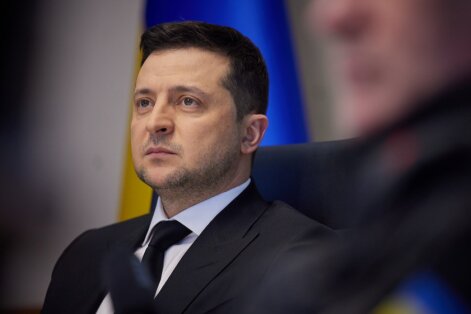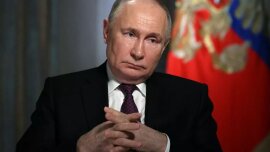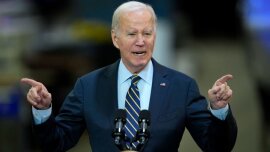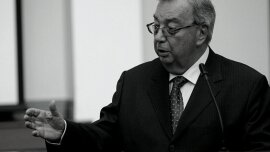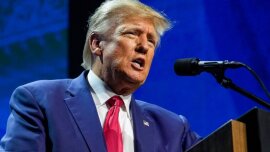A high rating in his first year of office provided President Volodymyr Zelensky with the opportunity to take the boldest steps, including those that directly impact the interests of the social groups who have supported him. Naturally, this could not last long. Draconian laws that have further degraded the business climate, an increase in tariffs, the emergence of more and more odious figures on Zelensky's team—as well as their extreme unprofessionalism—have all led to Zelensky's rating taking a free fall last winter.
Then Zelensky and his team began their use of the National Security and Defense Council (NSDC) as a tool to change the rules of the game. They started with pro-Russian oligarch Viktor Medvedchuk who was sanctioned, had his business seized, and several television channels in his media empire closed down. Medvedchuk himself was placed under house arrest, where he is now.
These steps caused a ripple effect that resulted in Zelensky gaining back 10% of his lost rating, which had been fixed at around 32-35%. At the same time, his team realized that NSDC sanctions can be a viable tool for forcing elites into compliance. Moreover, Zelensky's entourage slowly realized that using this tactic also creates the added potential for them to redistribute property.
This trick worked in the spring and summer of 2021. However, this eventually led to Zelensky being drawn into conflicts on all fronts. The NSDC made all the new lists of "guilty", which the Speaker of the Verkhovna Rada Dmitry Razumkov and the Minister of Internal Affairs Arsen Avakov did not want to sign. This led to Zelensky being in conflict with them, inevitably ending with Avakov's resignation in the summer and Razumkov's resignation in the fall. In parallel, in the spring, Zelensky's team launched an offensive against Kyiv Mayor Vitali Klitschko by trying to take away his executive power in the capital of Ukraine. However, their three waves of the attack on Vitali Klitschko failed. At the same time, a number of the victims who were negatively impacted by the NSDC lists have submitted appeals against the actions of the courts, with high probabilities of winning.
After the resignation of Dmitry Razumkov in October 2021, it seemed that Zelensky was at the zenith of power. However, very quickly the parliamentary opposition and leaders of public opinion began a new systemic wave of criticism, and the president's rating dropped to 20%.
Zelensky responded by passing the law on oligarchs. Experts noted that the key objective of this law was to cut off the oligarchs from the media, since Zelensky is extremely sensitive to criticism. It was the drop in ratings that forced him to strike at the media empire of the pro-Russian Viktor Medvedchuk. By eliminating Medvedchuk-Kozak-Shufrich, Zelenskyy blocked the Novosti media holding, which owns channels: 112 Ukraine, Newsone and Zik, Time Media LLC, including the First Independent TV channel, Teleprostir LLC and others. The measures will last for five years and, in actuality, are a ban on the operational activities of TV channels. These measures also immediately lowered the rating of the pro-Russian party, The Opposition Platform — For Life, confirming the idea that Ukrainian parties are lining up around their TV channels.
When it became clear that the Servants of the People party would use their influence on the media as a pretext for attacks, Petro Poroshenko quickly (former President of Ukraine) “sold” his media assets: the Pryamoy and Channel 5 TV channels, to the journalists who work there. Everyone understands perfectly well that this is a formality and Poroshenko still retains influence on these channels. But these are the new rules of the game.
Rinat Akhmetov's media group "Ukraine" was also targeted. In parallel, Zelensky decided to reorganize the state channels Suspilne, Rada and Dom. These channels, with a budget of about $80 million, have a very low aggregate view rate of about 1%. Medvedchuk's channels, with half the budget, had 4.5-5 times more audience coverage. Therefore, if Zelensky increases the quality of state channels, then he can significantly reduce his dependence on the oligarchic media. At the same time, his associates are buying small TV channels in order to have additional leverage over voters.
Separately, it is worth noting that the scandalous “Oligarch” law passed the criteria for selection of oligarchs into the hands of the same NSDC which received the right to subjectively determine who an oligarch is and is not. At the same time, obtaining the status of oligarchs threatened to complicate relations with Western banks, which is not very pleasant. The six-month delay between the adoption of the law and its enforcement (in May 2022) is used to negotiate with the oligarchs about relations within the framework of the new coordinate system. However, it is impossible to reach an agreement due to Zelensky’s refusal to equally distance himself from all key players and act as a non-bias. Quite the reverse, the president has become even closer to key oligarch Igor Kolomoisky as never before.
Against the background of Zelensky's unprecedented rapprochement with Kolomoisky, the president pursued open conflict with another oligarch, Rinat Akhmetov. In fact, some experts are certain the president has become a key instrument for Kolomoisky amidst an ongoing bout between two of Ukraine’s “heavyweight” oligarchs.
All of that being said, in November, the media learned that President Zelensky had a falling out with Ukraine’s largest oligarch, Rinat Akhmetov. Zelensky wanted Akhmetov to stop letting ex-speaker of the Verkhovna Rada Dmitry Razumkov on his TV channels. Akhmetov said that he did not influence the editorial policy of the channels and could not help with anything. Zelensky replied that this was not a request, but an order. After that, Akhmetov stopped communicating with Zelensky and criticism of the Servant of the People policy, and the President of Ukraine himself, only increased. During a meeting with journalists at the end of November and during a message from the Verkhovna Rada on December 1, 2021, Volodymyr Zelensky continued his sharp attacks toward Akhmetov. Although, at the same time, Bankova was looking for ways to reconcile. However, Rinat Akhmetov continued to ignore the Office of the President, thereby showing that he did not intend to enter into negotiations.
The conflict between Kolomoisky, Zelensky and Akhmetov unfolded against the backdrop of an acute energy crisis in Ukraine, which came about due to the president's team inability to adequately prepare for the heating season. Zelensky's team stubbornly refuses to admit that the rolling blackouts in Ukraine were caused by their own miscalculations. On the contrary, Zelensky's team tried to shift responsibility to Akhmetov, threatening that they could introduce temporary administrations at the power plant. At the same time, Akhmetov's energy company (DTEK) noted that it had prepared, in advance, for the heating season and had enough coal to ensure the normal operation of its power plants. Being the entity who essentially who imports coal from the United States and Colombia, DTEK publicly guarantees that none of their thermal power plants will be shut down due to a coal shortage.
Against the background of Zelensky’s battles with almost all of Ukraine’s major players—from Akhmetov to city mayors, another major oligarch (Igor Kolomoisky), feels more than delighted. Kolomoisky is Zelensky's Achilles heel. Despite a gaping $5.5 billion hole in Privatbank's balance sheet, the Ukrainian prosecutor's office has yet to bring charges against Kolomoisky.
In August 2020, the US accused Kolomoisky of stealing billions of dollars from PrivatBank and using a significant number of companies to launder this money in the US, and around the world. The US Department of Justice is demanding the confiscation of two commercial properties in the United States, which the oligarch purchased using funds stolen from Privatbank.
A criminal case has also been opened against Kolomoisky in Russia. The Department of the Ministry of Internal Affairs of the Republic of Tatarstan suspects him of stealing $4 billion worth of products from Tatneft in 2007. Kolomoisky, as well as three other Ukrainian businessmen—Gennady Bogolyubov, Alexander Yaroslavsky and Pavel Ovcharenko—are suspected of organizing a criminal community.
Since 2008, Tatneft has been trying to recover $2.4 billion in losses from Ukraine. In 2014, the International Commercial Arbitration Court in Paris ordered Ukraine to pay Tatneft $144 million in compensation for the loss of its stake in Ukrtatnafta. After that, Tatneft filed three petitions for enforcement of the arbitration award: in the USA, to the High Court of London and to the Moscow Arbitration Court. The London court granted the request. In 2020, the Federal Court of the District of Columbia in the United States upheld the decision to recover over $112 million from Ukraine in favor of Tatneft.
However, this does not prevent Kolomoisky from demanding from the Ukrainian state a share in the large state-owned company Ukrnafta, which is engaged in oil production in the country. Kolomoisky is blackmailing the government by threatening to demand billions of hryvnias for gas the state allegedly took from him, if he is not given the liquid part of the state company. Given that Ukraine is experiencing a serious fiscal crisis, any additional costs to the state budget are fraught with serious shocks.
Another example demonstrating the special status of importance Kolomoisky holds in Zelensky’s eyes is the activities of the oligarch's structures in the energy market. Kolomoisky's business structures were able to buy cheap electricity from Energoatom and sell it at market prices. For some time, they ran the state-owned company Centrenergo, which operated state-owned thermal power plants. As a result of this "management", Kolomoisky profited several tens of millions of dollars—at least.
So, why won't Zelensky put Kolomoisky in line?
The fact of the matter is that today Zelensky needs Kolomoisky since he provides him with media support on the TV channels of his media group, which has about 25% of the market. In addition, in parliament, the deputies of the For Maybutn political party—associated with Kolomoisky, regularly vote for key initiatives of Volodymyr Zelensky and his Servant of the People party. In fact, Kolomoisky received a “golden share” in conditions when Zelensky's faction in parliament began to slowly crumble. This is what allows Kolomoisky to impose his terms on Zelensky.
After the New Year, a scandal erupted in Ukraine due to the fact that Vladimir Zelensky and Igor Kolomoisky "accidentally" ended up in the same hotel in the Carpathians. At the same time, the law on oligarchs prohibits officials from meeting with oligarchs. Kolomoisky, however, made a statement that there was no meeting with Zelensky, to which social networks responded with hundreds of memes. This situation plays against Volodymyr Zelensky since, in 2019, he himself criticized Petro Poroshenko for his connection with the oligarchs. Yet, today, he is essentially doing the same thing.
In addition, this selectivity is in serious conflict with the general line of the United States. Indeed, back in June 2021, the Biden administration published a Memorandum recognizing the fight against corruption as one of the main interests of US national security, and Kolomoisky is viewed in Washington as a dangerous evil.
Finally, when Zelensky asks oligarchs to obey the rules, they naturally ask the question why the rules are not the same for everyone. They note that there are special oligarchs, like Kolomoisky, who are not subject to those rules.
This series of mistakes led Zelensky into a state of war, by the end of 2021, with almost all of the key oligarchs and political players. At the same time, unsuccessful economic reforms embittered social groups that supported Zelensky in 2019. The economic experiments of Daniil Getmantsev—the head of the Verkhovna Rada’s budget committee—led to small business being paralyzed (after the New Year) by the state who introduced a strict accountability rule without providing an appropriate infrastructure for it. As a result, businessmen everywhere were forced to abandon electronic payments and only accept cash, as transactions were paralyzed due to constant problems with servers.
Likewise, Zelensky’s attempt to personally target Ukraine’s key journalists has led the journalistic community to take a severely critical stance toward the president.
One cannot help but recall Thomas Hobbes' Leviathan:
“A person is selfish, he is endowed with strong passions, wants power, wealth, pleasure. The principle of his behavior is extremely simple: a person seeks to receive as many benefits as possible and avoid suffering. Human freedom: everyone has the right to everything, even to the life of another person. This leads to constant conflicts, to the impossibility of ensuring the public good and protecting oneself from evil. This is how a war of all against all arises."
Zelensky, who believed in his chosenness, could not curb his passions and found himself in just such a situation. Against the background of Vladimir Putin's threats to strike at Ukraine under one pretext or another, Zelensky's war on all internal fronts could end very badly both for him and for Ukraine.
